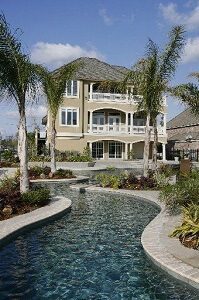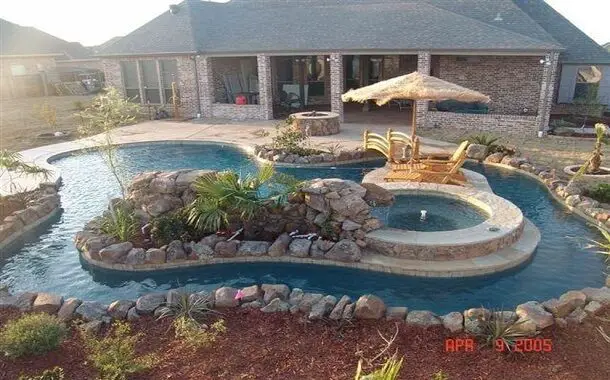How Much Does a Backyard Lazy River Cost?
Last Updated on February 21, 2024
Written by CPA Alec Pow | Content Reviewed by ![]() CFA Alexander Popinker
CFA Alexander Popinker
Adding a lazy river to your backyard can transform your outdoor space into a private oasis for relaxation and fun. But this luxury feature also comes with a significant price tag. Here’s an in-depth look at what factors impact the cost to install a lazy river in your residential backyard.
Highlights
- The average cost for a professionally installed backyard lazy river is $100,000 to $250,000.
- Custom designs with extra features can exceed $500,000.
- Key costs include excavation, concrete work, water systems, landscaping, permits, and installation.
- Ongoing maintenance averages $3,000 to $8,000 per year.
- Financing options are available to fund this luxury investment.
- A backyard lazy river can add significant property value and provide years of enjoyment.
How Much Does a Backyard Lazy River Cost?
Constructing a backyard lazy river requires extensive planning, permitting, excavation, materials, and professional installation. Costs add up quickly, with the average backyard lazy river ranging from $100,000 to $250,000. Custom designs with extra features like waterfalls, hot tubs, and slides can exceed $500,000.
While not cheap, a lazy river can provide years of enjoyment and even boost your property value. Weighing the costs against the benefits can help determine if this investment is right for your home.
A Reddit post, for example, highlights that a lazy river could easily cost $120,000+.
Construction Costs
The base construction of a backyard lazy river makes up a significant portion of the overall budget. Key costs include:
Installation Fees
Professional installation is recommended for proper drainage, construction, and safety. Many companies charge around $50 per square foot for lazy river installation.
Design Costs
Custom lazy river designs by a landscape architect average $5,000 to $15,000. This planning is essential for optimal layout, flow, and aesthetics.
Excavation
Digging out the area for an in-ground river costs around $25 per square foot depending on soil conditions. For a 500 sq ft river, that’s $12,500 in excavation alone.
Concrete Work
Reinforced concrete to build up the lazy river walls and foundation can add $20 to $50 per square foot. Materials and labor are both considerable expenses.
Components & Systems
The technical elements that make a lazy river function also have price tags attached:
Water Pump – Powerful pumps to circulate water against the river current run $1,500 to $4,000 depending on size and capacity.
Filtration System – Multi-step filtration systems maintain water cleanliness and clarity. Expect costs of $3,000 to $10,000 or more.
Electrical Wiring – Electrical work is required to supply power to lighting, pumps, controls and other components. This can cost several thousand dollars.
Lighting Features – Lighting enables nighttime use and adds ambiance. Underwater and landscape lighting ranges from $2,500 to $5,000 installed.
Landscaping & Design
The surroundings and aesthetics of a lazy river require planning and investment:
You might also like our articles about the cost of building a pool house, an endless pool, or to have your pool water delivered.
Landscape Architect
An experienced landscape architect ensures optimal river design and can cost $5,000 or more for their services.
Design Plans
The specific plans and drawings to execute the project usually run a few thousand dollars as well.
Custom Stonework
Rocks, boulders, and waterfalls made of natural stone can have price tags in the tens of thousands of dollars.
Vegetation and Planting
Plants, trees, and greenery help integrate the river into your landscape for $2,500 to $10,000.
Regulatory & Safety
Proper permitting, adherence to laws, and safety steps also factor into the backyard lazy river cost:
Permits and Regulations – Permits and fees to comply with state and local codes average $1,500 to $5,000.
Safety Measures – Required safety features like fences, nets, and anti-entrapment drains cost around $5,000 to $10,000.
Zoning Restrictions – If your property is subject to zoning limitations, you may need to request exemptions to allow for the lazy river installation.
Maintenance & Upkeep
 Ongoing maintenance and operation costs should be accounted for when budgeting your project:
Ongoing maintenance and operation costs should be accounted for when budgeting your project:
Regular Maintenance – Plan for $2,500 to $5,000 per year for basic cleaning, water testing, system checks, etc.
Seasonal Maintenance – Opening and closing the river each season costs around $1,500 to $3,000 annually.
Energy Efficiency – Energy-saving pumps and motors cost more up front but pay off through lower electrical bills.
Water Conservation – Leak detection, covers, and other water-saving elements help cut utility costs.
Financial Aspects
From budgeting to financing, the monetary considerations of a lazy river are essential:
Budget Planning
Develop an accurate budget with a 10-20% contingency for incidentals and overages.
Financing Options
Many homeowners use a home equity loan or line of credit to fund the project without draining savings.
Cost-Saving Strategies
Optimize the layout to minimize excavation needs, or use a modular plastic liner instead of concrete.
Property Value
This luxury addition can increase property value by 5-10% or more, offering a return on investment.
Additional Features & Enhancements
Optional upgrades create a truly customized backyard oasis:
Water Features – Add excitement with waterfalls, fountains or splash pads starting around $5,000.
Outdoor Lighting – LED lighting, lanterns, and torches create dramatic nighttime ambiance for $3,000 to $5,000.
Sound Systems – Integrated audio enables you to listen to music while floating along, starting around $1,500 installed.
Leisure Accessories – Drink holders, water guns, water hammocks, and more let you optimize the experience.
Frequently Asked Questions
What is the average depth of a lazy river?
Most backyard lazy rivers have a depth between 3 to 5 feet throughout. This allows for comfortable sitting or floating in inner tubes without requiring swimming skills. The depth provides enough immersed volume for efficient circulation as well.
How does water move in a lazy river?
Lazy rivers use powerful pumps and motors to continuously push the water against the natural downstream current. This creates the feeling of gently drifting around the river path. The pump system draws water through filters and jets to keep it clean and flowing.
What is the average speed of a lazy river?
A typical backyard lazy river design allows you to circle the loop in 10 to 20 minutes, with a water speed of less than 2 mph. This relaxed pace creates a soothing, peaceful experience as you travel along immersed in the gently flowing water.


Leave a Reply
Want to join the discussion?Feel free to contribute!